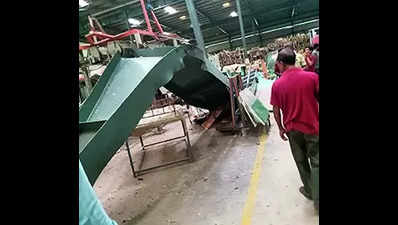- News
- City News
- Hyderabad News
- 'Faulty' compressor triggered glass unit blast: Factories department
Trending
'Faulty' compressor triggered glass unit blast: Factories department
The protest at the University of Hyderabad resulted in the suspension revocation of five students, leading to legal actions against them. It emphasized the critical need for third-party agencies to maintain machinery and prevent accidents.

Blast site at the glass factory
The protest, which began on June 24, was in response to the suspension of five students for participating in a protest in front of the vice-chancellor's residence on May 18 against the postponement of Sukoon, the university's cultural festival.After the suspension, the students' union went on an indefinite strike near the statue of Rohith Vemula in Velivada. One of the protesters, G Mohith, said the suspension was lifted on Friday night, but the university said it would issue an official statement on Monday.
In addition to their suspension, an FIR has been registered against the five students. They, along with five others, have been fined 10,000 each.
"Protesting is not a crime for which we have to pay a fine," Mohith added.
Firm ignored safety rules, say workers
Autoclave valve is a crucial component in the compressor used in the glass manufacturing process, an expert said.
Workers of the factory alleged their safety concerns were ignored by the company management. Police registered a case of death by negligence under IPC section 304-A against the company.
Friday’s incident was not an isolated one, as seven major accidents had taken place in factories and industrial units in the last one year due to gas/ compressor/reactor blasts in the state, claiming the lives of 20 people and injuring several others. In the South Glass factory, the compressor’s malfunctioning was a direct result of poor maintenance that led to hazardous accumulation of pressure, a factories official said. “The autoclave machine’s valve — designed to release pressure when it reaches critical levels — failed to function properly. Consequently, the glass placed inside the compressor shattered under immense pressure, and the fragments propelled outward hitting the nearby workers with deadly force,” he said.
B Raja Gopal, director of factories, said South Glass should have engaged a private agency on a contract basis to ensure proper functioning of equipment to prevent such disasters. “The third party agency should be conducting a thorough assessment of the machinery once or twice annually, evaluating its operational condition and performance. By taking a pro-active approach, the company should have identified any issues or vulnerabilities in the equipment before they escalate into critical failures,” he said.
He also said it was crucial for companies to prioritise the upkeep of their machinery to safeguard their employees, facilities, and surrounding environment from devastating accidents.
End of Article
FOLLOW US ON SOCIAL MEDIA










